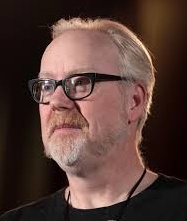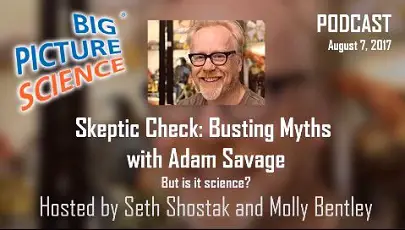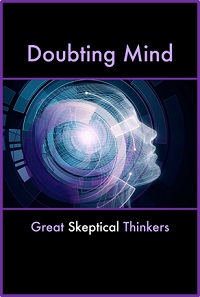|
TRANSLATE THIS ARTICLE
Integral World: Exploring Theories of Everything
An independent forum for a critical discussion of the integral philosophy of Ken Wilber
 David Christopher Lane, Ph.D.
Professor of Philosophy, Mt. San Antonio College Lecturer in Religious Studies, California State University, Long Beach Author of Exposing Cults: When the Skeptical Mind Confronts the Mystical (New York and London: Garland Publishers, 1994) and The Radhasoami Tradition: A Critical History of Guru Succession (New York and London: Garland Publishers, 1992). David Christopher Lane, Ph.D.
Professor of Philosophy, Mt. San Antonio College Lecturer in Religious Studies, California State University, Long Beach Author of Exposing Cults: When the Skeptical Mind Confronts the Mystical (New York and London: Garland Publishers, 1994) and The Radhasoami Tradition: A Critical History of Guru Succession (New York and London: Garland Publishers, 1992).
DOUBTING MIND
Great Skeptical Thinkers
Susan Blackmore |
Brian Cox |
Martin Gardner |
Sam Harris |
Christopher Hitchens |
Harry Houdini |
Ray Hyman |
Phillip J. Klass |
Joe Nickell |
James Randi |
Adam Savage |
Eugenie Scott
Adam SavageBrian TamAdam Savage was born in New York City. During his childhood, he was raised in Sleepy Hollow, New York. When Savage was a child, his curiosity on how things work ignited his thinking on skepticism and atheism later on. He graduated from Sleepy Hollow High School. Later after enrolling in N.Y.U.'s Tisch School of the Arts program he dropped out six months later. He married Julia Savage in 2002 and is the father of two children. Over the past decades, Adam has mainly focused on films, television shows, animation, and design. He is mostly known for his contribution to science and skeptical thinking through his MythBusters television show, which is an Australian-American science entertainment television program by the Discovery Channel that “promotes math and science for young people and to think critically by employing the scientific method.”  Adam Savage In the podcast Point of Inquiry, host Karen Stollznow spoke with Adam Savage about how he applies skepticism and atheism to his scientific methodology in MythBusters. When talking about how myth perpetuates, Adam Savage believes that it is a natural human inclination that guides him to know more about how our world actually works. In MythBusters, their experiments are heavily based on logical reasoning and critical thinking; it is the core of the science, hinged on evidence and analysis by performing a scientific experiment, and the illustrate how the thing works by testing it out. In Savage's viewpoint, the scientific methodology serves as an approach to understanding the truth of the world. However, as he pointed in the podcast, he is trying to test it rather than to prove it. The difference between them is that the latter one always requires a conclusion such as true or false, and the former one does not. This method emphasizes the importance of the experiences itself. By doing more than two thousand separate experiments in MythBusters, from dropping a Mentos into a bottle of Diet Coke to talking or playing music to plants to see whether it will help them grow, Savage considers himself to be a budding scientist. Regardless of what the result of the experiment would be, such a grounded method demonstrates how an empirical way of thinking proceeds. During the process of building a scientific hypothesis, it requires modeling and design. When the hypothesis is employed, it will look for supporting evidence to see if it holds up to rational scrutiny and experimentation. According to Skeptic Magazine, “Modern skepticism is embodied in the scientific method, that involves gathering data to formulate and test naturalistic explanations for natural phenomena. A claim becomes factual when it is confirmed to such an extent it would be reasonable to offer temporary agreement. But all facts in science are provisional and subject to challenge, and therefore skepticism is a method leading to provisional conclusions.” The scientific experiments in MythBusters deliver outcomes that can be regarded as a provisional conclusion on how things operate. It is very significant to note that it is not a definite conclusion on such phenomena but a temporary and tentative one. The physicist Albert Einstein said, “Science will never be a finished book. Any development over time reveals more and deeper difficulties”. The methodology in science is changing continuously. Regardless of the experimental outcome, each experiment can have different results when using a different methods to test. Nevertheless, this perspective is opposite to what a religion promotes which relies more on faith than in logic and reasoning. Fundamental concerns such as morality, ethical values, and aesthetic judgments can scarcely be handled by science. It might be argued that it is out of the realm of science's province. For instance, even if computational A.I. is trained to overview billions of behaviors and patterns, it will still be emotionally laden humans who will be the final adjudicators on how to live a moral life, even though A.I. may help in our ultimate decisions. In April 2010, Savage delivered a speech to the Harvard Humanism Society about morality, “I want to start by saying that, to me, any discourse from me about how one can live a moral existence without religion or the church would sound improperly defensive. That there's an opposite to be defended is absurd and based on a provably false premise. So, let's dispense with that.” He has also indicated that it is false that there exists no morality outside of religion. "A man's ethical behavior should be based effectually on sympathy, education, and social ties and needs; no religious basis is necessary. Man would indeed be in a poor way if he had to be restrained by fear of punishment and hopes of reward after death.” said the famous physicist Albert Einstein. What is suggested is that religion and morality are inseparable. For people who have faith in secular morality like Savage and Einstein, they believe morality is within humanity itself. “I've noticed that if I'm paying attention to those around me, to myself, to my surroundings, then that is the very definition of empathy. I've noticed that when I pay attention, I'm less selfish, I'm happier—and that the inverse holds true as well.” said Savage. If the morality of religion is based on faith, it is reasonable to infer that their secular morality based on pure perception from the brain. In the podcast show Big Picture Science in mid-2016, Savage has proclaimed that he would rather say that he is a scientist or critical thinker than skeptic or atheist as he thinks that the idea of skepticism is overly negative nowadays. However, his respect and thought for truth are still identical to what a skeptic would put forward even though he is no longer likes the label skeptic. Further Reading1. Erik Zavrel, How the Science Entertainment Television Show MythBusters Teaches the Scientific Method, www.researchgate.net, July 2018. 2. Big Picture Science: Skeptic Check: Busting Myths with Adam Savage, www.youtube.com, 7 Aug 2017 
PREFACE | David Christopher Lane
Before the current pandemic altered our day to day lives, the MSAC Philosophy Group had been working on a book entitled, Doubting Mind: Great Skeptical Thinkers, which contained separate essays on a number of notable researchers who champion critical thinking and skepticism when analyzing paranormal claims, such as UFOs, astrology, and various religious claims. The book has now been finished, though it took a bit longer than we anticipated. The word skeptical has too often been conflated with the word cynical. The former term comes from the Greek word skepsis which properly defined means "to look, view, observe." Or, as Miguel de Unamuno explained in 1924 in his book, Essays and Soliloquies, "Skeptic does not mean him who doubts, but him who investigates or researches as opposed to him who asserts and thinks that he has found." To be cynical, on the other hand, indicates that the person is "[pre] disposed to disbelieve or doubt the sincerity or value of social usages or personal character or motives and to express it by sarcasm and sneers, disparaging of the motives of others, captious, peevish." Therefore, it is important to understand that a skeptic is not one who ad hoc dismisses borderland ideas, but is one who is willing to go the extra mile to gather more (not less) information about any given phenomenon. As I have often remarked (to the obvious consternation of certain cult followers), we, humans, are too gullible when we accept miraculous claims without further investigation. We are cheap sluts for the paranormal, believing too easily in conspiracy theories that defy the known law of physics. There are many reasons why this is so, but I suspect that in a world where everything eventually eats one another to survive (whether it be a vegan eating plants or a carnivore eating meat), any organism that can develop a buffering illusion to survive such a horror show has an evolutionary advantage over others that cannot. This came into sharper relief for me this past week as I watching the British made television mini-series, War of the Worlds, where in one particularly poignant scene a mother who has just witnessed the death of her children at the hands of an alien species realizes that there is no point in continuing to live in such a horrific environment. She opts to shoot herself and the viewer instead of being shocked perfectly sympathizes with her decision. Nature is a madhouse if looked at objectively and therefore it is not surprising that we have evolved all sorts of mental defense systems in order to live long enough on terra firma to pass on our genetic heritage. Since we are the survivors in this boiling cauldron of eat or be eaten, we have inherited a variety of tools to ward off the true existential dread that can overcome any being that becomes too keenly aware of how this DNA game plays out. I mention all this as a necessary preface, since no matter how well versed we may become in science (and trained to become good doubters, in the positive sense of that term), we still retain at the core of our beings a deeply emotional component that defies a purely rational or logical way of being. We may act like scientists from time to time, but we are not scientists in the long term. We are vulnerable creatures and our myths and our fairy tales will persist even if we opt for agnosticism or atheism, though they may take on a different color and hue and justifications. Thus, this book provides us with but a small glimpse of how to think more rationally and critically, despite the sobering realization that we cannot be great skeptics all the time.
Comment Form is loading comments...
|